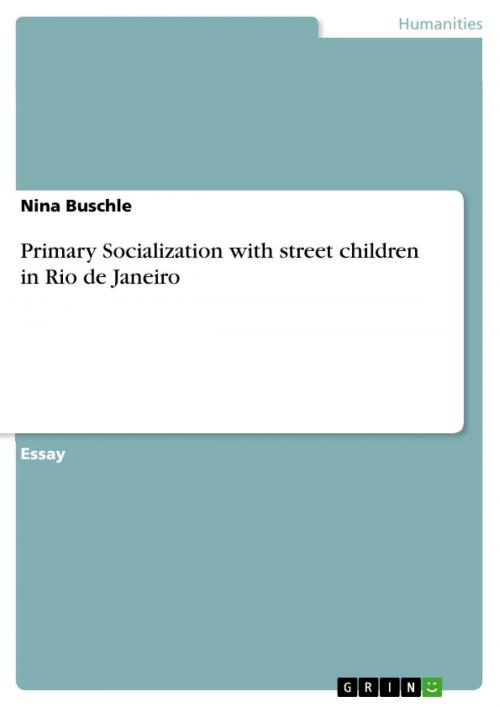Primary Socialization with street children in Rio de Janeiro
Nonfiction, Social & Cultural Studies, Social Science, Cultural Studies, Ethnic Studies| Author: | Nina Buschle | ISBN: | 9783638630894 |
| Publisher: | GRIN Publishing | Publication: | March 29, 2007 |
| Imprint: | GRIN Publishing | Language: | English |
| Author: | Nina Buschle |
| ISBN: | 9783638630894 |
| Publisher: | GRIN Publishing |
| Publication: | March 29, 2007 |
| Imprint: | GRIN Publishing |
| Language: | English |
Essay from the year 2005 in the subject Cultural Studies - Basics and Definitions, grade: 2,3, Zeppelin University Friedrichshafen, course: Cultural Studies, 6 entries in the bibliography, language: English, abstract: 'An upper-class child may learn the 'facts of life' at an age when a lower-class child has mastered the rudiments of abortion technique. Or, an upper-class child may experience his first stirrings of patriotic emotion about the time his lower-class contemporary first experiences hatred of the police and everything they stand for.' 1 This quotation symbolizes the subject of my essay: I will delve into the term of Berger/Luckmann's Primary Socialization in 'The social construction of reality'. I want to compare their idea/perception of the ideal primary socialization of a child within the society with the current situation of street children in Rio de Janeiro, Brazil. It is important to know a little bit about the historical background of Brazil to understand why the social levels differ so greatly. I will also try to explain possible consequences and perspectives of these children. I chose this subject because I grew up in Rio de Janeiro. I learned to love this country, but I could also recognize the immense injustice rampant in this country. Especially in my situation, as a person who comes from a 'good' and safe family, I asked myself since I was a little child: Why do I have so much and those children nothing? [...]
Essay from the year 2005 in the subject Cultural Studies - Basics and Definitions, grade: 2,3, Zeppelin University Friedrichshafen, course: Cultural Studies, 6 entries in the bibliography, language: English, abstract: 'An upper-class child may learn the 'facts of life' at an age when a lower-class child has mastered the rudiments of abortion technique. Or, an upper-class child may experience his first stirrings of patriotic emotion about the time his lower-class contemporary first experiences hatred of the police and everything they stand for.' 1 This quotation symbolizes the subject of my essay: I will delve into the term of Berger/Luckmann's Primary Socialization in 'The social construction of reality'. I want to compare their idea/perception of the ideal primary socialization of a child within the society with the current situation of street children in Rio de Janeiro, Brazil. It is important to know a little bit about the historical background of Brazil to understand why the social levels differ so greatly. I will also try to explain possible consequences and perspectives of these children. I chose this subject because I grew up in Rio de Janeiro. I learned to love this country, but I could also recognize the immense injustice rampant in this country. Especially in my situation, as a person who comes from a 'good' and safe family, I asked myself since I was a little child: Why do I have so much and those children nothing? [...]















